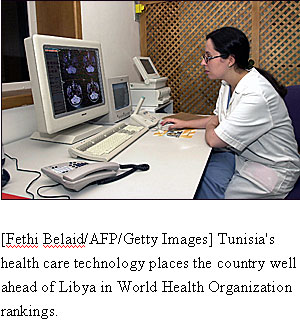
Public investments have improved Libya's health infrastructure, the Ministry of Health reports, but critics claim that citizens are fleeing the country to find better care.
Libyans are criticising an April 4th government report that describes the country's health care as expansive and top-of-the-line.
"Reports like this are created at a time of need to tell lies," Libyan rights activist Mohammed Sehim said.
Libya's government spent $2 billion on health care in 2009, according to the Ministry of Health's Information and Documentation Centre report. The country has 97 hospitals, 20,689 hospital beds, 40 CT scanners, 20 MRI machines, 9 angiography machines and 3 radiotherapy devices, according to the report.
Critics, however, claim that the picture painted by the Ministry of Health does not reflect the reality on the ground.
"The health condition in Libya is awful, as shown by citizens who are forced to sell their cars and houses to receive treatment in neighbouring countries – not at the expense of the authority as mentioned in the report," Sehim said.
A single hospital in Benghazi serves all of eastern Libya from Ras Lanuf to Imsaad, Sehim said –an area containing half of the country's territory.
"These exaggerated figures are no more than a case of puffing up, to dispel the sense of failure," he said.
The World Health Organisation ranks Libya's health system as 87th in the world, behind Tunisia (52nd), Morocco (29th) and Algeria (81st). It ranks ahead of Mauritania at 162nd place.
Journalist Aatef Latrach criticised the report for its lack of detail on the quality of health care.
"The report doesn't include anything about the quality of professional and educational courses that the doctors joined and the medical conferences that the medical institution they have effectively participated in," he said.
The government avoids "evaluation in most of their sectors so as not to prove their shortcomings and hence be held accountable," Latrech said.
The true measure of health quality, he said, lies with the numbers of Libyans who travel abroad for medical treatment -- a trend that Libyan government officials try hard to spin positively, he said.
This content was commissioned for Magharebia.com. |

